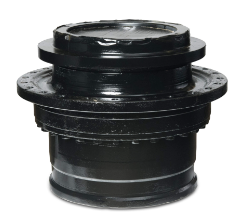Hydraulic Forces Behind Excavators
- RALPH COPE

- Apr 20, 2024
- 5 min read

Hydraulics is an essential field within fluid mechanics that plays a pivotal role across various industrial applications. At the heart of hydraulic technology is the fundamental principle of transmitting force and energy through liquids. This science forms the backbone of many systems used in construction, manufacturing, and even aviation. One of the most significant applications of hydraulics is in the operation of hydraulic excavators, which are critical in construction and demolition. These machines rely on hydraulic power to handle heavy materials and perform tasks with precision and efficiency. This blog delves deep into the principles of hydraulics, emphasizing the operation of hydraulic excavators.
Fluid Mechanics Fundamentals
Hydraulics is based on fluid mechanics, which studies the behavior of fluids either at rest or in motion. The properties of hydraulic fluids are crucial, as they impact the system's efficiency and safety. Viscosity, or the fluid’s resistance to flow, affects how well fluid can transmit pressure. Compressibility, which is the measure of the volume change under pressure, is another critical factor, as hydraulic fluids are typically incompressible. Lastly, lubricity, which is the fluid's ability to minimize friction within the system, ensures the longevity of various hydraulic components.
Pascal’s Law
At the core of hydraulic systems is Pascal’s Law, which states that pressure applied to a confined fluid is transmitted undiminished throughout the fluid. This principle is what allows a hydraulic system to amplify force and perform work such as lifting heavy loads or crushing hard materials.
Components of Hydraulic Systems
Hydraulic Pumps: These convert mechanical energy from the engine into hydraulic energy by pushing hydraulic fluid into the system under pressure.
Hydraulic Cylinders: These actuators generate force and motion that extends or retracts to move attached mechanisms like the arm or bucket of an excavator.
Hydraulic Motors: These convert hydraulic energy back into mechanical energy to drive wheels or tracks.
Control Valves: These direct the flow of hydraulic fluid between the cylinders, motors, and reservoir, regulating the system's pressure and flow rate.
How Hydraulic Excavators Work
Overview of Hydraulic Excavators
Hydraulic excavators are heavy construction equipment that consists of a boom, dipper (or stick), bucket, and cab on a rotating platform known as the "house." The house sits atop an undercarriage with tracks or wheels. Designed primarily for digging, they are also used for many other tasks like demolition, lifting, and river dredging.
Hydraulic System in Excavators
The hydraulic system in an excavator is sophisticated, involving various components working in unison. Hydraulic fluid is pumped through the system, transferring energy to the excavator’s working parts. The pressure and flow within the hydraulic system dictate the force exerted by the excavator and the speed at which operations can be performed.
The Power Source: Hydraulic Pumps
Hydraulic pumps in excavators are robust and efficient, designed to handle large loads. They are typically of three types: gear, piston, and vane pumps. Each type offers different characteristics in terms of efficiency and capacity, suitable for various functions of an excavator.
Force and Movement: Hydraulic Cylinders and Motors
Hydraulic cylinders are crucial for the movement of an excavator's boom, arm, and bucket. They enable precise control over these movements, essential for tasks requiring fine manipulation. Hydraulic motors allow for the rotation of the cab and the movement of the excavator’s tracks or wheels.
Control Systems: Valves and Automation
Valves play a vital role in managing how hydraulic fluid is distributed and directed through the excavator’s system, affecting the operation's smoothness and efficiency. Modern hydraulic excavators incorporate sophisticated electronics and sensors to achieve greater precision and control, making them easier to operate and more efficient.
Hydraulic Fluids and Maintenance
Importance of Hydraulic Fluids
Hydraulic fluids are integral to the proper functioning of hydraulic systems. They must be specifically formulated to handle the operating pressures and temperatures while minimizing wear and corrosion within the system.
Maintenance of Hydraulic Systems
Routine maintenance is critical for the longevity and efficiency of hydraulic systems. This includes regular checks for leaks, monitoring fluid levels and quality, and replacing filters and seals as needed. Proper maintenance prevents common issues such as contamination, which can lead to system failures.
Applications of Hydraulic Excavators
Hydraulic excavators are ubiquitous in the construction industry, where they are used for tasks ranging from excavation to demolition. They are also seen in mining, forestry, and other industries where heavy materials need to be moved and manipulated. Special attachments like breakers, grapples, and augers extend their functionality further.
Advances in Hydraulic Technology
Recent advancements in hydraulic technology include improvements in hydraulic fluid formulations and more efficient pump designs. Emerging technologies like electro-hydraulic systems, which combine traditional hydraulics with electronic controls, enhance the performance and capabilities of hydraulic systems.
Conclusion
The power and versatility of hydraulic systems make them indispensable in many sectors, particularly in heavy machinery like hydraulic excavators. Understanding the principles of how these systems work, maintaining them diligently, and staying updated with technological advancements can optimize their performance and extend their service life. As technology evolves, so too will the capabilities of hydraulic systems, continuing to impact the industrial landscape significantly.
Will it be Possible to Have an Excavator in the Future Without Hydraulic Fluids?
Yes, it is entirely feasible that in the future we could see the development of fully electric excavators that operate without hydraulic fluids. This concept aligns with broader trends towards electrification and sustainability in various industries, including construction equipment. There are several factors driving the potential shift from hydraulic to electric systems:
1. Advancements in Electric Drive Technology
Electric drive technology has been advancing rapidly, with significant improvements in electric motors, batteries, and control systems. These advancements make it possible to provide sufficient power and precision for heavy-duty tasks traditionally performed by hydraulic systems.
2. Environmental Considerations
Electrification can significantly reduce the environmental impact of heavy machinery. Electric excavators would not require hydraulic oil, eliminating risks of leaks that could contaminate the soil and water. Moreover, electric machines produce zero emissions at the point of use, which is crucial for operating in environmentally sensitive areas or within cities that are imposing stricter emissions regulations.
3. Maintenance and Operational Efficiency
Electric systems generally require less maintenance than hydraulic systems because they have fewer moving parts and do not need fluid changes or leak inspections. Electric excavators could potentially offer lower operating costs over their lifetime, coupled with higher efficiency and less downtime.
4. Noise Reduction
Electric motors operate much more quietly than diesel engines and hydraulic systems, which is a significant advantage in urban or residential areas. Noise reduction enhances worker comfort and complies with local regulations regarding noise pollution.
5. Integration with Renewable Energy
Electric excavators can be directly integrated with renewable energy sources. For example, they can be charged using solar or wind power, further reducing their carbon footprint and operating costs.
Challenges to Overcome
Despite these advantages, several challenges need to be addressed before fully electric excavators can become commonplace:
Battery Technology: The primary challenge is the energy density of batteries. Heavy machinery requires a significant amount of power and long operational hours, which current battery technology may not always support effectively. Advancements in battery capacity and fast charging technologies will be crucial.
Cost: Currently, the initial cost of electric excavators can be higher than traditional hydraulic models, primarily due to the expensive batteries and electric drive systems. However, as technology advances and scales up, these costs are expected to decrease.
Infrastructure: Adequate charging infrastructure and power availability are necessary to support electric machinery, especially in remote or undeveloped areas.
As these challenges are addressed through technological advancements and increased investment in electrification, it's likely that the shift towards fully electric excavators will accelerate. Companies like Volvo and Komatsu have already introduced electric prototypes and small-scale electric machines, signaling a clear trend towards the broader adoption of this technology in the construction industry.








Comments